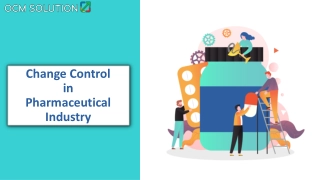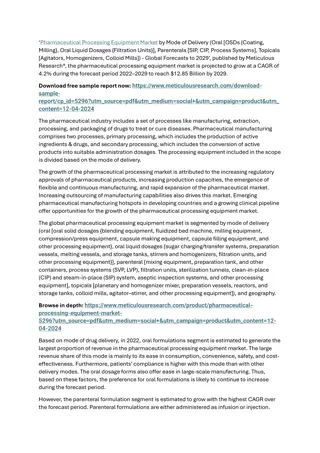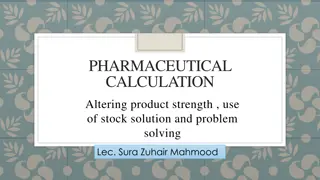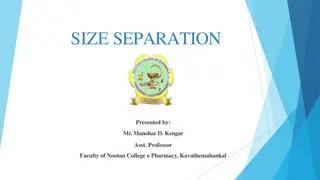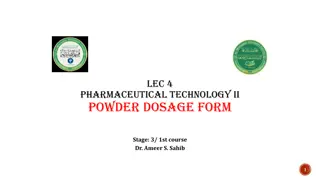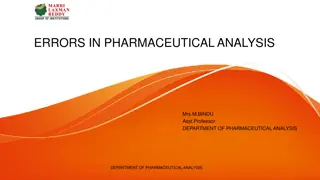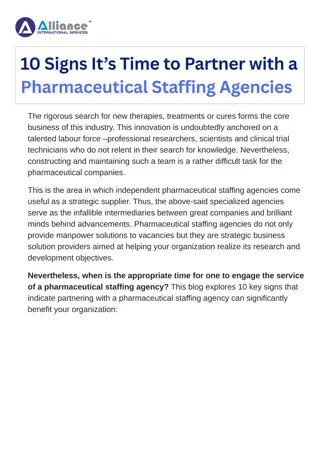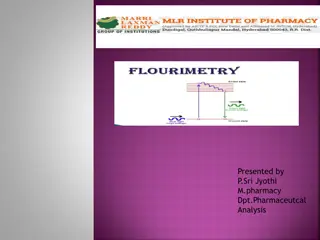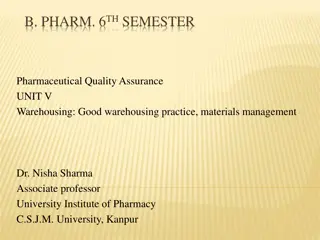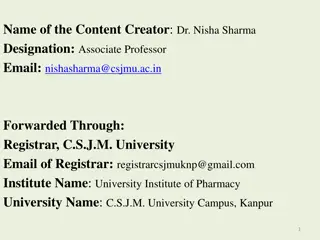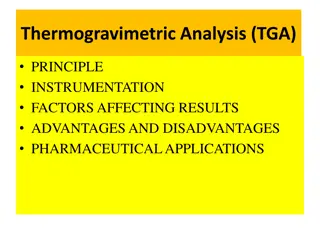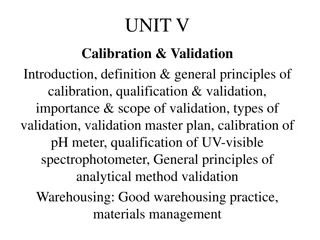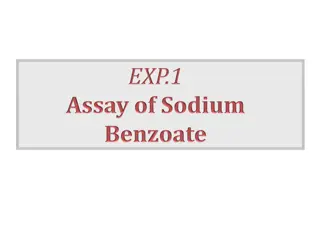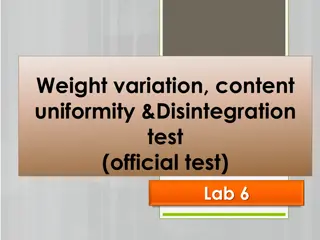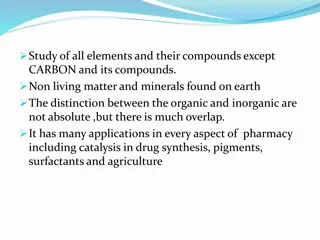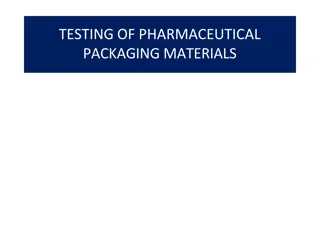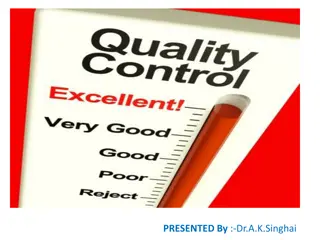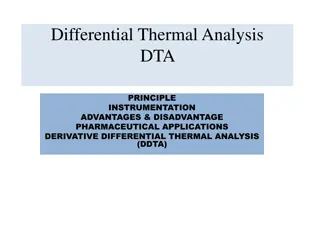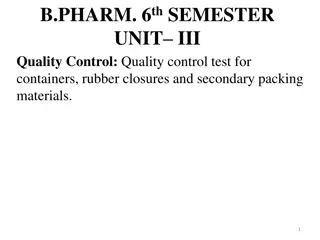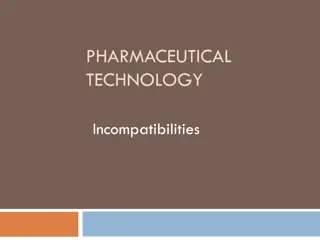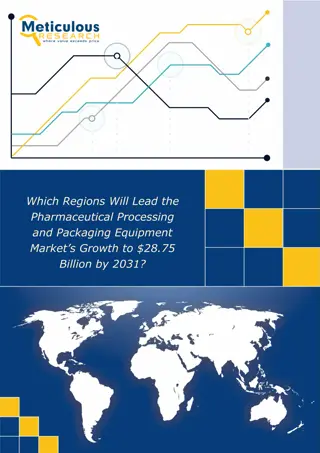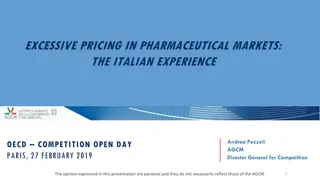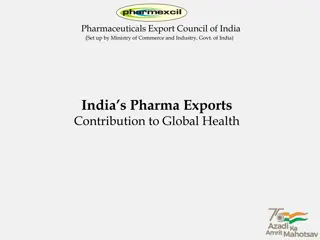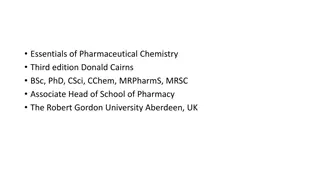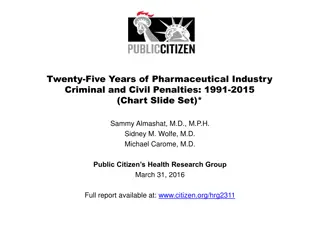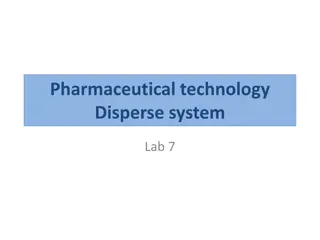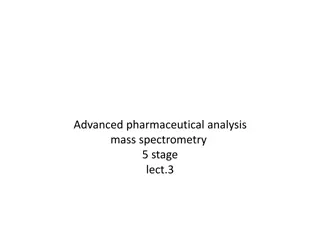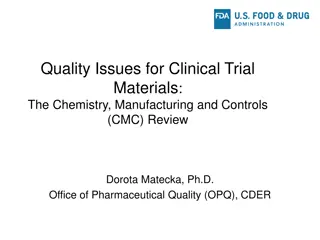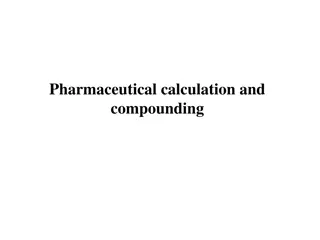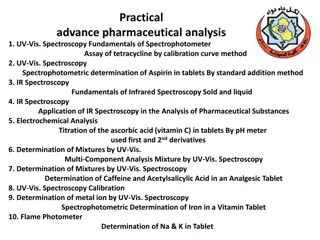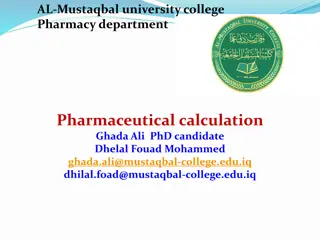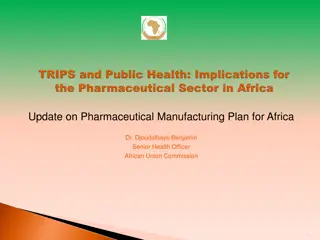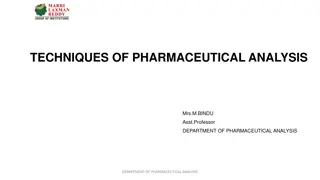Pharmaceutical-Contract-Development-and-Manufacturing-Market
In addition, the growing demand for cell and gene therapies and personalized medicines and growth in the High-potency Active Pharmaceutical Ingredients (HPAPI) and Antibody-drug Conjugates (ADC) markets are expected to offer significant opportunities for the growth of the pharmaceutical contract dev
1 views • 4 slides
Change Control in Pharmaceutical Industry
Change control in the pharmaceutical industry is a critical process that ensures the management of alterations to maintain product quality and compliance with regulatory standards. It involves categorizing changes as minor, major, or critical, each requiring specific handling to minimize risks and u
2 views • 14 slides
Pharmaceutical Processing Equipment Market
Pharmaceutical processing includes a range of unit operations such as blending, milling, granulation, tablet pressing, coating, and filling, depending on the mode of delivery. With the growing adoption of continuous manufacturing and the rising number of novel therapies in clinical development, phar
1 views • 2 slides
Understanding Physiological Acid-Base Balance in Pharmaceutical Inorganic Chemistry
This lecture delves into the fundamental concepts of pharmaceutical inorganic chemistry, focusing on the mechanisms and uses of various pharmaceutical products that correct body disorders. Topics covered include acids and bases, intra and extracellular electrolytes, and the role of buffers in mainta
10 views • 14 slides
Understanding Pharmaceutical Calculations and Laboratory Apparatus
Pharmaceutical preparations must be effective, safe, and accurate in both quantitative and qualitative aspects. This includes ensuring the accurate amount and identity of ingredients. Laboratory apparatus such as mortar and pestle, wide mouth bottles, cylindrical and conical measure cylinders, and c
4 views • 20 slides
Understanding Pharmaceutical Calculations: Altering Product Strength and Solutions
Pharmaceutical calculations involve altering the strength of pharmaceutical preparations by adjusting the proportion of active ingredients, using stock solutions, and problem-solving techniques. This process includes dilution, fortification, and concentration changes to achieve desired product stren
7 views • 23 slides
CPGP Study Guide and How to Crack Exam on Pharmaceutical GMP Professional
Click Here--- \/\/bit.ly\/4bsglWA ---Get complete detail on CPGP exam guide to crack Pharmaceutical GMP Professional. You can collect all information on CPGP tutorial, practice test, books, study material, exam questions, and syllabus. Firm your knowledge on Pharmaceutical GMP Professional and get r
3 views • 35 slides
The Strategic Advantage of Pharmaceutical Staffing Agencies
Unlock the strategic advantages of pharmaceutical staffing agencies. Explore how they accelerate R&D, streamline hiring, ensure compliance, and support emerging fields. Partner with us for enhanced innovation and success in the industry. For more information, visit: \/pharmaceutical-recruitment-age
0 views • 5 slides
ASQ Pharmaceutical GMP Professional (CPGP) Exam | Boost Your Score
Click Here---> \/\/bit.ly\/4bsglWA <---Get complete detail on CPGP exam guide to crack Pharmaceutical GMP Professional. You can collect all information on CPGP tutorial, practice test, books, study material, exam questions, and syllabus. Firm your knowledge on Pharmaceutical GMP Professional and get
0 views • 20 slides
Understanding Size Separation in Pharmaceutical Processing
Size separation is a crucial unit operation in pharmaceutical manufacturing, involving the segregation of particles based on physical differences like size, shape, and density. This process, also known as sieving or screening, is essential for improving powder mixing, particle solubility, and stabil
1 views • 31 slides
Understanding Pharmaceutical Powders in Dosage Forms
Pharmaceutical powders play a vital role in various dosage forms, serving as carriers of active ingredients and enabling diverse administration routes. They are meticulously characterized for their physical and chemical properties before being utilized in medicinal preparations. Furthermore, the con
2 views • 48 slides
Understanding Errors in Pharmaceutical Analysis
This article explores different types of errors in pharmaceutical analysis, such as determinate and indeterminate errors, and discusses their impact on analysis results. It also covers the concepts of accuracy, precision, and minimizing systematic errors in analytical chemistry. The importance of id
1 views • 37 slides
10 Signs It’s Time to Partner with a Pharmaceutical Staffing Agencies
Find out the top 10 indicators that signal it's time to partner with a pharmaceutical staffing agency. Enhance your hiring process, access top talent, and stay ahead in the competitive pharmaceutical industry with expert staffing solutions. For more
0 views • 6 slides
Understanding Fluorescence Analysis in Pharmaceutical Sciences
Fluorescence analysis is a crucial technique in pharmaceutical analysis, involving the emission of radiation by molecules when excited at specific wavelengths. Factors influencing fluorescence, such as concentration, light intensity, adsorption, oxygen presence, pH, temperature, viscosity, and photo
2 views • 26 slides
Pharmaceutical Quality Assurance: Unit V - Warehousing Practices by Dr. Nisha Sharma
Explore the importance of good warehousing practices in the pharmaceutical industry as discussed in the 6th-semester course of Pharmaceutical Quality Assurance. Dr. Nisha Sharma elaborates on the concepts of warehousing, GWP, key activities, functions, and elements of good warehousing practices, emp
1 views • 17 slides
Pharmaceutical Equipment Selection and Maintenance Guidelines for Quality Assurance
This content focuses on the selection, purchase specifications, and maintenance of equipment and raw materials in pharmaceutical quality assurance. It emphasizes the importance of well-defined selection procedures, strategic impact on business, and considerations for equipment design, size, and main
1 views • 20 slides
Understanding Thermogravimetric Analysis (TGA) in Pharmaceutical Applications
Thermogravimetric Analysis (TGA) is a technique that measures weight changes in a material as it is heated or cooled. This analysis helps in understanding decomposition, stability, and purity of pharmaceutical compounds. TGA operates on the principle of monitoring mass changes with temperature, offe
0 views • 27 slides
Principles of Calibration, Validation, and Warehousing in Pharmaceutical Quality Assurance
Calibration and validation are critical processes in maintaining the quality of pharmaceutical products. Validation ensures that processes result in expected outcomes consistently, meeting quality standards. Qualification is an essential part of validation, ensuring that equipment and systems perfor
1 views • 37 slides
Sodium Benzoate: Properties, Applications, and Pharmaceutical Uses
Sodium benzoate is a white crystalline powder with various physical and chemical properties. It is commonly used as a preservative in pharmaceutical formulations, cough preparations, and cosmetic products. Additionally, it has pharmaceutical applications in treating urea cycle disorders and schizoph
0 views • 9 slides
Pharmaceutical Tablet Testing Procedures and Considerations
This informative content delves into weight variation, content uniformity, and disintegration tests conducted in pharmaceutical laboratories. It discusses official testing methods, factors affecting test outcomes, and requirements for ensuring potency uniformity and tablet quality. Content covers we
0 views • 15 slides
Inorganic Pharmaceutical Chemistry: Applications and Importance
Inorganic pharmaceutical chemistry explores the study of elements and compounds excluding carbon, with diverse applications in pharmacy. It encompasses the synthesis and use of inorganic compounds in drug development, catalysis, pigments, and agriculture. The field also delves into the medicinal val
1 views • 6 slides
Quality Control Tests for Pharmaceutical Packaging Materials
This article discusses quality control tests for pharmaceutical packaging materials focusing on glass containers. The tests include chemical resistant tests such as powdered glass test and water attack test, as well as hydrolytic resistance tests. Detailed procedures for each test are outlined along
3 views • 18 slides
Overview of Pharmaceutical Packaging: Basic Terminologies, Quality Control Tests, and Container Types
Pharmaceutical packaging plays a crucial role in maintaining the effectiveness and safety of medications. This content delves into basic terminologies, quality control tests for containers, closures, and secondary packaging, as well as an introduction to general packaging practices. It also covers t
0 views • 35 slides
Understanding Pharmaceutical Preparations: Strength and Concentration
Pharmaceutical preparations can have their strength and concentration adjusted by changing the proportion of active ingredients. This process involves increasing or decreasing the active ingredient, adding diluents, admixing with other preparations, or evaporating the vehicle. Dilution of liquid, so
0 views • 34 slides
Understanding Differential Thermal Analysis (DTA) in Pharmaceutical Applications
Differential Thermal Analysis (DTA) is a technique used in pharmaceutical applications to monitor temperature differences between a sample and reference material. By analyzing temperature changes over time or against temperature, DTA helps in detecting phase transitions and reaction temperatures in
0 views • 22 slides
Quality Control Tests for Containers, Rubber Closures, and Packaging Materials in Pharmaceutical Industry
Quality control testing is essential for containers, rubber closures, and secondary packaging materials in the pharmaceutical industry to ensure product protection, identification, and presentation. Various materials like glass, plastic, metal, and rubber are used for containers and closures, each h
1 views • 34 slides
Understanding Pharmaceutical Technology Incompatibilities
Pharmaceutical incompatibilities can lead to issues during compounding, dispensing, or administration of drugs. They are classified into physical, chemical, and therapeutic types, with potential delays or reduction in therapeutic effectiveness. Physical incompatibilities may involve insolubility or
1 views • 15 slides
Pharmaceutical Processing & Packaging Equipment Market
The rise in the pharmaceutical processing & packaging equipment market is attributed to the booming pharmaceutical industry, regulatory needs, increasing disease burden, aging population, and the shift towards flexible manufacturing solutions.\n
0 views • 3 slides
Excessive Pricing in Pharmaceutical Markets: The Italian Experience
The presentation by Andrea Pezzoli explores the issue of excessive pricing in pharmaceutical markets, focusing on the Italian experience. It covers cases of infringement on excessive prices, such as the Aspen pharmaceutical group's fine for unfair pricing. The regulatory framework in Italy, includin
4 views • 22 slides
India's Significant Contributions to Global Healthcare Through Pharmaceutical Exports
India, a key player in the global pharmaceutical sector, significantly contributes to global health through its pharmaceutical exports. The country provides generic medicines to over 200 countries, with a notable presence in highly regulated markets. India's pharmaceutical exports showcase impressiv
7 views • 7 slides
Understanding Pharmaceutical Chemistry: A Comprehensive Overview
Pharmaceutical chemistry delves into the study of drugs, encompassing their development, discovery, synthesis, absorption, metabolism, and more. It involves the design and synthesis of biologically active molecules to create new pharmaceuticals or enhance existing drug structures. Chemistry plays a
0 views • 5 slides
Analysis of Pharmaceutical Industry Criminal and Civil Penalties from 1991-2015
This data presentation highlights the number of settlements and financial penalties incurred by the pharmaceutical industry over the span of 25 years, from 1991 to 2015. The charts reveal trends in both the number of settlements and the financial implications, broken down by federal and state levels
0 views • 29 slides
Understanding Pharmaceutical Suspensions: Types, Preparation, and Characteristics
Explore the world of pharmaceutical suspensions, including their types based on dosage form and particle size, advantages of using suspensions, features desired in pharmaceutical suspensions, and classification based on the nature of solids involved in the suspension. Learn about the preparation met
0 views • 12 slides
Understanding Mass Spectrometry in Pharmaceutical Analysis
Delve into the intricacies of mass spectrometry as applied to pharmaceutical analysis, exploring the fragmentation processes, allylic cleavage in alkenes and alkynes, and the characterization of aromatic hydrocarbons. Discover how mass spectrometry aids in identifying and analyzing various compounds
0 views • 31 slides
Quality Issues in Clinical Trial Materials: CMC Review by Dr. Dorota Matecka
Clinical trial materials undergo Chemistry, Manufacturing, and Controls (CMC) review to ensure pharmaceutical quality. This process includes assessing safety concerns, impurities, and specifications, along with other CMC considerations. Pharmaceutical quality encompasses the suitability, identity, s
0 views • 41 slides
Pharmaceutical Calculation and Compounding Course Overview
This course provides pharmacy students with a foundation in pharmaceutical calculations including concentration expressions, density, isotonicity, and more. The curriculum focuses on practical skills essential for pharmacy practice. Students will learn how to handle medicinal prescriptions and perfo
2 views • 46 slides
Practical Advances in Pharmaceutical Analysis Using Spectroscopy Techniques
This comprehensive guide covers various spectroscopy techniques, including UV-Vis and IR spectroscopy, as well as electrochemical analysis and flame photometry, for pharmaceutical analysis. It delves into the fundamentals of molecular spectroscopy, discussing electromagnetic radiation, quantum energ
0 views • 19 slides
Understanding Buffers in Pharmaceutical Formulations
Buffers in pharmacy play a critical role in maintaining constant pH levels essential for drug stability and efficacy. They resist pH changes by neutralizing added acids or bases, ensuring proper drug delivery and patient comfort. Common buffer systems, such as acetic acid/sodium acetate and boric ac
4 views • 18 slides
Update on Pharmaceutical Manufacturing Plan for Africa by Dr. Djoudalbaye Benjamin
The update on pharmaceutical manufacturing plan for Africa discusses the TRIPS agreement, the inception of the Pharmaceutical Manufacturing Plan for Africa (PMPA), and the importance of promoting access to quality healthcare through local pharmaceutical manufacturing in Africa.
0 views • 25 slides
Analytical Techniques in Pharmaceutical Analysis
Analytical techniques play a crucial role in determining the identification and concentration of chemical substances in pharmaceutical analysis. Techniques range from simple gravimetric analysis to sophisticated methods using specialized instrumentation. Various techniques like gravimetric, titrimet
0 views • 17 slides

